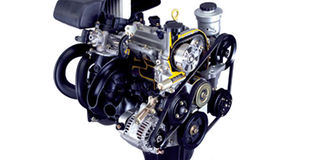Ask the Mechanic

WHICH PETROL ENGINE IS MORE EFFICIENT, 1.5L OR 1.8L?
Hello Paul, I am looking to buy a car but I do not know which engine between 1.5cc or a 1.8cc is more efficient. I am looking at the Toyota ISIS 1.8cc, Honda Airwave 1.5cc and Rumion 1.5cc. Francis
Hello Francis, the choice of engine size is usually driven by fuel economy, performance needs or purpose of the vehicle. Ordinarily, the smaller 1.5litre petrol engine should give you a superior fuel economy of about 16-18 kilometres per litre while the bigger 1.8litre engine will give you about 14-16 kilometres per litre.
However, these statistics are subject to how you drive (habits, aggressiveness), engine maintenance and engine efficiency improving technology, size and shape of the car, terrain and use of efficiency improving fuel.
How you drive matters. On the highway, when you drive fast to maintain speed, the smaller 1.5 litre engine will work harder and its fuel economy will drop significantly as its rev curves operate in the higher fuel thirstier rev bands. The 1.5 litre petrol engine fuel economy may drop down below 16 kilometres per litre if pushed hard on the highway. So, driving a small engine in itself is not a guarantee to superior fuel economy.
A slightly bigger 1.8 litre engine may prove to be more efficient when driving in performance demanding situations such as the highway because it is able to attain momentum and provide good performance at lower rev bands which convert into lower fuel economy. Equally, smaller petrol engines will give you superior fuel economy in the city or peri-urban traffic. This is because the performance demand is moderate, which balances well with fuel economy demands. Engine maintenance and efficiency improving technology. The engine service condition of the lubrication, ignition and air intake systems affects engine efficiency (fuel economy and performance).
Some modern engines and transmissions are designed with efficiency improving technology such as direct four (D4) fuel injection, Variable Valve Timing intelligent (VVTi) and turbo charging. These engines have improved fuel economy, often better than smaller engines without the technology.
Size and shape (design) and purpose of car can affect its efficiency. For instance, the bulkier, boxy 1.5 litre Toyota Rumion will provide the same fuel economy figures as the bigger but more aerodynamic 1.8 litre Toyota ISIS on the highway because of efficiency-sapping wind resistance. A fully loaded eight-seater 1.5 litre Honda Airwave may have the same fuel economy as the 1.8litre Toyota ISIS with four passengers on the highway or hilly terrain.
Fuels designed with efficiency (performance and economy) improving additives and technology can be game changers in fuel economy statistics regardless of engine size. I have participated in fuel saving races using more efficient fuels and seen 1.8 litre Toyota cars achieve better than stated fuel economy of 18km/litre while 1.5 litre engines posted 19-20km/litre. Of course, efficient fuels were combined with good driving habits and engine service condition.


WHY DOES MY CAR HAVE PERSISTENT COLD STARTS?
Hello Paul, my car has persistent cold starts even after changing the cold start switches several times. Secondly, the car normally shakes (locally known as okupipila) when I start it, especially after being parked for more than two hours. However, if it has been parked for only a few minutes, it starts normally. What could be the problem?
Najib
Hello Najib, your car’s poor performance and hard cold start persists because the cause of this situation has not been resolved. Which cold start switches has your mechanic changed? Can you identify them? It is important to test and inspect components that usually cause hard cold starts before you replace them to avoid misdiagnosis.
Consider the main causes of poor engine performance during cold hard starts; fuel system pressure, ignition system (spark plugs), air intake system (throttle unit, air temperature sensor), coolant temperature sensor, EGR system, lubrication system and starting system. Get the fuel system inspected to determine fuel system pressure, should the fuel pressure value appear to be below the recommended values, consider replacing the fuel filter or fuel pump.
The ignition system spark plugs can cause a hard start if they are worn out or of poor quality. The air intake system can cause a hard cold start if it is faulty. Check for dirty restricted air cleaner, faulty mass air flow sensor and air temperature sensor or faulty throttle unit.
A faulty coolant temperature sensor will prevent cold start fuel enrichment (allows auto rev up or choking of the engine Electronic gas recirculation valves will prevent good engine performance during and after cold starts. Wrong or dirty engine oil can make cold starts more difficult.
Send sms: mycar (space) your comments and questions to 6933
Or email them to: [email protected]




